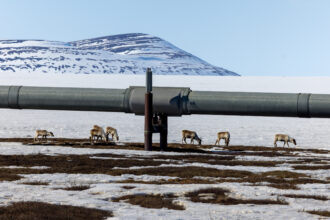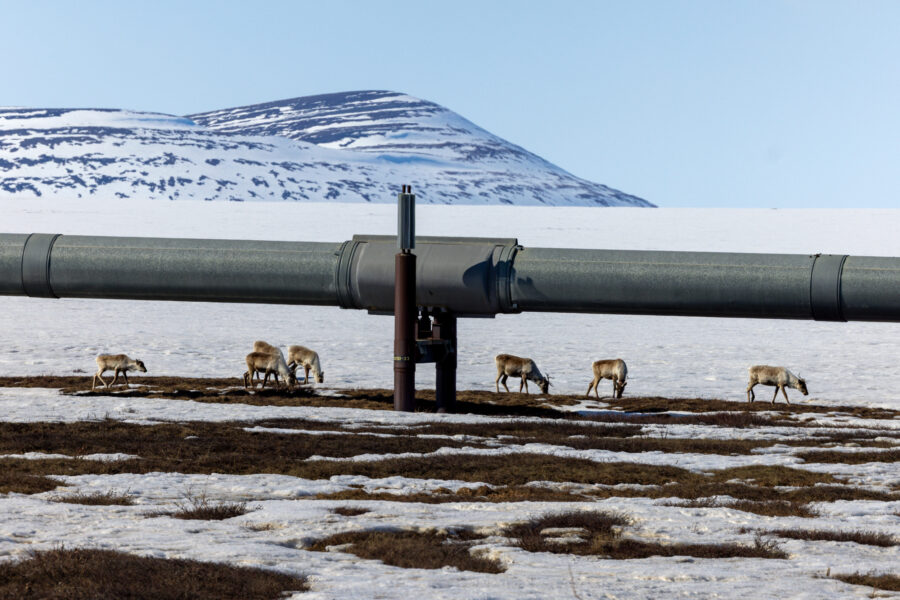Kivalina, a small Inupiat village in northwestern Alaska, is being forced to relocate.
Its 400 residents will shortly become some of the world’s first climate refugees. And they’re taking a rather novel route for paying for the move: They’re suing a group of energy companies for creating a public nuisance and for conspiracy—that is, for funding research to “prove” there is no link between climate change and human activity.
The case, Native Village of Kivalina v. ExxonMobil Corp., et al., went to court a couple weeks ago in California and could be enormously important.
It is one of the first lawsuits tied to anthropogenic global warming that seeks to use conspiracy law to press for civil damages from trans-national corporations—in this case, up to $400 million, the upper-bound estimate for relocation costs.

Kivalina is endangered because thinning sea ice and surging seas threaten its territorial integrity. Waves that were once blocked by sea ice lap and slam into the community’s buildings regularly. The Army Corps of Engineers asserted in 2006 that the situation was “dire,” while the U.S. General Accounting Office gives numbers for relocating at up to $400 million.
If the conspiracy argument sounds familiar, a look at the Kivalinians’ lead attorney list offers a hint and a touch of irony: Lead co-counsel Steve Susman, a partner at Susman Godfrey LLP, represented tobacco conglomerate Philip Morris against the array of lawsuits filed against it by state attorneys general in the 1990s. He probably knows a good bit about the relevant portions of civil conspiracy statutes that residents of Kivalina are charging the defendants with violating.
The complaint reads,
Kivalina brings this action against defendants under federal common law and, in the alternative, state law, to seek damages for defendants’ contributions to global warming, a nuisance that is causing severe harm to Kivalina. Kivalina further asserts claims for civil conspiracy and concert of action for certain defendants’ participation in conspiratorial and other actions intended to further the defendants’ abilities to contribute to global warming. …
Additionally, some of the defendants, as described below, conspired to create a false scientific debate about global warming in order to deceive the public. Further, each defendant has failed promptly and adequately to mitigate the impact of these emissions, placing immediate profit above the need to protect against the harms from global warming.
The defendants include BP America, Chevron, ConocoPhillips, ExxonMobil, Peabody Energy, American Electric Power, Duke Energy and Southern Company, all of which were accused of conspiracy, plus several other companies accused of creating a public nuisance and also implicated in massive carbon emissions.
ExxonMobil spokesman Gantt Walton waved off the conspiracy claim, saying: “The recycling of this type of discredited conspiracy theory only diverts attention from the real challenge at hand — how to provide the energy to improve living standards while also reducing greenhouse gas emissions.”
It’s unclear if Walton was claiming that it was a “conspiracy theory” that energy corporations had funded fatuous climate research, since that’s a touch more like a documented fact.
That still doesn’t mean a quick or easy battle for the Kivalinians, though.
Legal analyst Dustin Till remarks that similar cases haven’t fared well. Judges have preferred to leave such supposedly contentious issues to legislators, being “political” and not legal issues.
But he adds that while the case may well fail to prevail, due to issues relating to causation, “jurisdictional challenges,” and whether or not there are justiciable claims,
“success on the merits could open a floodgate of similar litigation by other coastal jurisdictions that are grappling with the costs of adapting to rising sea levels and other environmental changes attributable to global warming.”
It’s not total non-sense that the companies that profited most from emitting carbon into the commons should have to pay for the consequences of their actions.
See also:
Melting Ice Could Lead to Massive Waves of Climate Refugees
Ocean Refugee Alert: The Torres Strait Islands are Drowning
World’s First Climate Refugees to Leave Island Home
About This Story
Perhaps you noticed: This story, like all the news we publish, is free to read. That’s because Inside Climate News is a 501c3 nonprofit organization. We do not charge a subscription fee, lock our news behind a paywall, or clutter our website with ads. We make our news on climate and the environment freely available to you and anyone who wants it.
That’s not all. We also share our news for free with scores of other media organizations around the country. Many of them can’t afford to do environmental journalism of their own. We’ve built bureaus from coast to coast to report local stories, collaborate with local newsrooms and co-publish articles so that this vital work is shared as widely as possible.
Two of us launched ICN in 2007. Six years later we earned a Pulitzer Prize for National Reporting, and now we run the oldest and largest dedicated climate newsroom in the nation. We tell the story in all its complexity. We hold polluters accountable. We expose environmental injustice. We debunk misinformation. We scrutinize solutions and inspire action.
Donations from readers like you fund every aspect of what we do. If you don’t already, will you support our ongoing work, our reporting on the biggest crisis facing our planet, and help us reach even more readers in more places?
Please take a moment to make a tax-deductible donation. Every one of them makes a difference.
Thank you,











